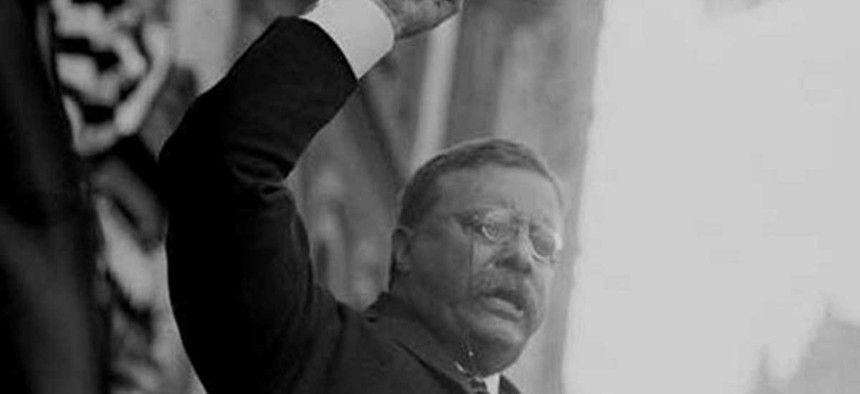
Wikimedia Commons
Teddy Roosevelt's Contested Convention
For the 26th president's supporters, forcibly wresting political control away from the party bosses was always an acceptable option.
Would a candidate for president of the United States ever officially condone a riot on the floor of a national convention? Would a candidate actually ever seek to provoke one? Should delegates at a convention be permitted to carry guns? Can supporters of a candidate try to buy delegate votes? Could any of these things happen at a contested Republican Convention this year in Cleveland?
It seems unlikely, but there would be precedents. Amazingly, in 1912, when Theodore Roosevelt tried to wrest the nomination from William Howard Taft, there were plans for riots, plenty of guns, and more than a few attempted and perhaps actual bribes.
Even though he had groomed Taft as his handpicked successor in 1908—describing him as the most lovable man he knew—Roosevelt decided to come out of retirement in 1912 and challenge the sitting president for the Republican nomination. Up to then, delegates to national conventions were picked by party leaders, but when it became clear that he could not win over the men who controlled the party machinery, Roosevelt embraced a new idea: presidential primaries. His campaign theme became: “Let the people rule.” There were 13 primaries that year, and when Roosevelt won nine of them and 70 percent of the elected delegates, he claimed to have right to the nomination. But most of those delegates had been picked in the old-fashioned way. So when Taft’s supporters used the power of his incumbency to pressure delegates and control the proceedings, Roosevelt—or men acting in his name—resorted to more creative and belligerent tactics.
Some of those same themes have been in the news this year.
When Donald Trump told CNN, “I think you’d have riots,” if the Republican Party’s leaders denied him the nomination, people were understandably disturbed. But on the eve of the 1912 convention, Roosevelt told his nephew that his supporters were prepared to “use roughhouse tactics” to “terrorize” the party’s leaders if they denied him the nomination. His delegates included men who were used to barroom brawls, including several who had been with his Rough Rider brigade in the Spanish American War. When the proceedings started, Roosevelt’s managers flooded the Chicago Convention Center bleachers with rugged supporters who were prepared to use their voices and even their fists to fight for their demand that Roosevelt be selected.
In a plan hatched by some of Roosevelt’s more aggressive supporters, Roosevelt’s floor manager, Missouri Governor Herbert Hadley, was supposed to shout out an appeal to the convention chair’s rulings. According to the plan, that would be a signal to Roosevelt’s supporters to start a massive demonstration—hopefully one that could only be stopped by the police, probably with bloodshed.
And the police, as the slightly cheeky American Magazine observed, were everywhere:
Not since the Haymarket Riot have so many members of this fine body of constabulary been gathered in one place. They were in the galleries; they patrolled the aisles and mingled with the delegates, scrutinizing them with the familiar expression they wear when elbowing through a crowd of hoodlums and trying to ‘spot’ those who are ‘liable to start something’; in the passageways there were scores of them, actually, and this is no exaggeration, crouched along the walls ready to spring with club and pistol in hand upon this historical deliberative assemblage.
Once the police had attacked the Roosevelt boosters—and perhaps done so rather brutally—in front of the world’s press, the strategy called for Roosevelt’s supporters to walk out of the hall and hold their own convention, where they would claim to be the true Republican Party. It was the kind of tactic that they had used—and used effectively—earlier at state conventions in Michigan, Washington, and elsewhere.
But the plan was never executed. At the last moment, Hadley decided not to give the signal for the demonstration. Remembering those events a decade later, he recalled that he had made the unilateral decision not to “resort to rough stuff,” because he was convinced that with so many police guarding the hall, there would be too much bloodshed. In his words, Roosevelt’s supporters “would have been badly worsted.” That led some of Roosevelt’s supporters, including California Governor Hiram Johnson, to accuse Hadley of cowardice. After the convention, Johnson berated “the timid and shrinking” men who had viewed “with such horror” the proposal to seize control of the convention by force.
This year, when an online petition proposed that delegates be allowed to enter the Cleveland Convention with guns, the Secret Service promptly—and properly—shut the idea down. “Only authorized law enforcement personnel working in conjunction with the Secret Service for a particular event,” they held, “may carry a firearm inside of the protected site.”






